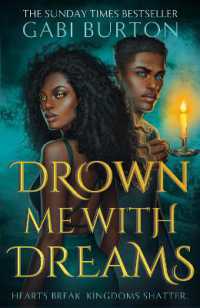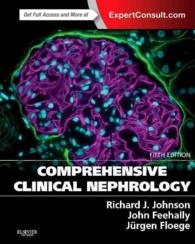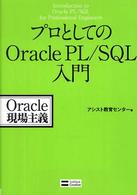- ホーム
- > 洋書
- > 英文書
- > Business / Economics
Full Description
Cutting Edge Research Methods in Hospitality and Tourism sits at the forefront of fast-paced developments in the tourism and hospitality industry, highlighting the importance of applied and pure research to address the theoretical and practical problems and gaps. Approaching from different perspectives including economic, social, cultural, environmental, political, and technological, this edited collection reviews traditional research methods and re-assesses them to suit contemporary problems and research agendas.
Developing recent research strategies under the umbrella of quantitative and qualitative research methods - such as the use of structural equation modeling analysis, applied econometric research, network theory and social network analysis, using tracking mobility and planning exercises, fuzzy-set Qualitative Comparative Analysis, necessary condition analysis, and netnography approaches - can offer promising solutions.
A necessity for academics and practitioners in the tourism and hospitality sector, Cutting Edge Research Methods in Hospitality and Tourism expands existing knowledge, generating innovative research.
Contents
Chapter 1. Introduction; S. Mostafa Rasoolimanesh, Shiva Jahani, and Fevzi Okumus
Chapter 2. Which SEM to Use and What to Report? A Comparison of CB-SEM and PLS-SEM; Ahmet Usakli and S. Mostafa Rasoolimanesh
Chapter 3. Using PLS-SEM to Test for the Moderation effects of Continuous Variables in Hospitality and Tourism Studies; Guy Assaker and Peter O'Connor
Chapter 4. Econometric Analysis in Hospitality and Tourism Management; Yang Yang, Graziano Abrate, and Chunrong Ai
Chapter 5. Tourism Growth, Income Inequality and the Dependence between their Quantiles: Evidence from Quantile on Quantile Approach; Syed Ali Raza, Nida Shah, Ronald Ravinesh Kumar, and Md. Samsul Alam
Chapter 6. Network Analysis in Tourism and Hospitality: A comprehensive review; Filipa Brandão, Zélia Breda, and Carlos Costa
Chapter 7. Why not Study What Tourists Actually do, instead of asking them What they Think they do?" A call for more experiments in tourism and hospitality research; Malin Zillinger
Chapter 8. Guideline for Application of Fuzzy-set Qualitative Comparative Analysis (fsQCA) in Tourism and Hospitality Studies; S. Mostafa Rasoolimanesh, Naser Valaei, and Sajad Rezaei
Chapter 9. Application of Necessary Condition Analysis (NCA) in Hospitality and Tourism Research; Wangoo Lee, Jan Dul, and Zsofia Toth
Chapter 10. Netnography and its Potential for Studies in Tourism and Hospitality; Irina Valerie Gewinner
Chapter 11. Conclusions; Shiva Jahani, Fevzi Okumus, and S. Mostafa Rasoolimanesh







